Family Ministries
This awesome retreat is for women ages 14-114!
There are special breakouts for the teen girls! So, moms, bring your daughters and grandmothers bring your granddaughters for a weekend to remember! You'll be glad you did!

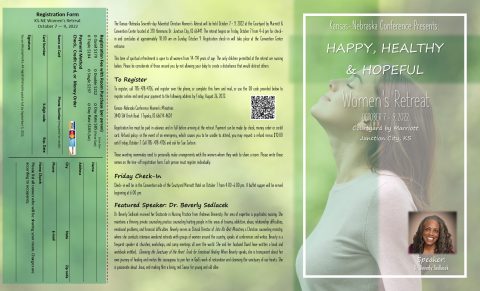
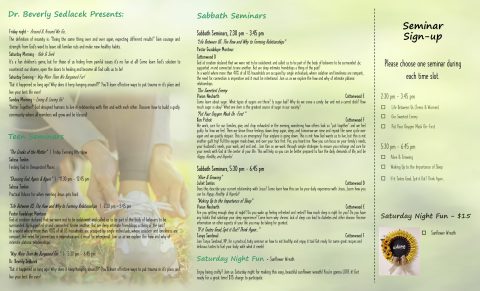

Lineage Journey...
Hey families! Need something inspiring, entertaining and educational for your family to do on a hot summer day?
Check out www.lineagejourney.com Lineage is a resource that translates history into the language of today through interactive media.
It includes short, shareable videos, all filmed on location, and a multifaceted educational website. Understand
the legacy of those who brought us to where we are today, and be challenged to follow in their footsteps. For more about
this great series of videos read this write up in the Adventist Review. https://adventistreview.org/reaching-the-secular-mind-the-lineage-journey/
An Attitude of Gratitude...
At Thanksgiving we are thankful for our food, but we are grateful for so much more than that. Why not take a few moments at your Thanksgiving table this year to recognize the other blessings in your life as well? Here’s a short devotional and simple worksheet to help you do this. Happy Thanksgiving!
Sue Carlson, Family Ministries Director



Once a year the North American Division provides fabulous training on the subject of abuse. Abuse takes on many forms and affects all ages and all genders. Thank you for taking the time to educate yourself on this sensitive topic in order to create safe places in your homes, churches and communities as well as minister to those who have been hurt in the past. To be part of this free EnditoNow Summit on Abuse simply click this link https://www.enditnownorthamerica.org/summitonabuse
Sunday, November 14 from 12:00-4:00 pm Central Time in English and Monday, November 15, 12:00-4:00 pm Central Time in Spanish.

Jesus 101 Biblical Institute Video Bible Stories for Kids
Your kids will enjoy these video Bible stories for kids with downloadable coloring pages to go with the stories from Jesus 101 Biblical Institute!
Welcome to Jesus 101 4Kids! | Jesus 101
You can still join...
Life CPR: 8 weeks to healthier relationships!
Those who register are part of our free resource drawings each night! You must be present in the session when your name is drawn to win.
To register email: cbarker@ks-ne.org or call 785-478-4726
Our next session is Tuesday, May 25 @ 6:00 - 7:00 PM CDT

Life CPR - Zoom Session Recordings
Zoom Recording Session #1: https://youtu.be/6lgOUYRCidE
Zoom Recording Session #2: https://youtu.be/TGQg2F75Pm4
Zoom Recording Session #3: https://youtu.be/LG4w5mvbfUo
Zoom Recording Session #4: https://youtu.be/D8_lmJNWxUw
Zoom Recording Session #5: https://youtu.be/WUeBjkdkvaY
Zoom Recording Session #6: https://youtu.be/PQ-3KcVv0mk
Zoom Recording Session #7: https://youtu.be/2Sd_CuuRg1g
Zoom Recording Session #8: https://youtu.be/CzKKmioRoIg
Handouts for the Sessions:
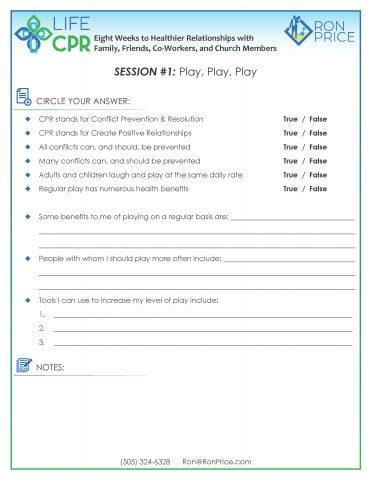
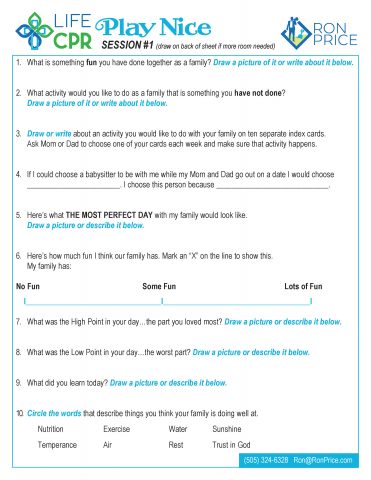
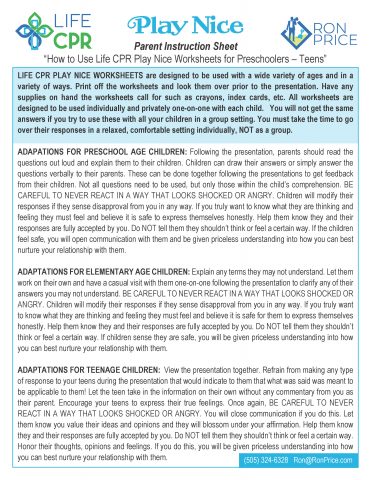
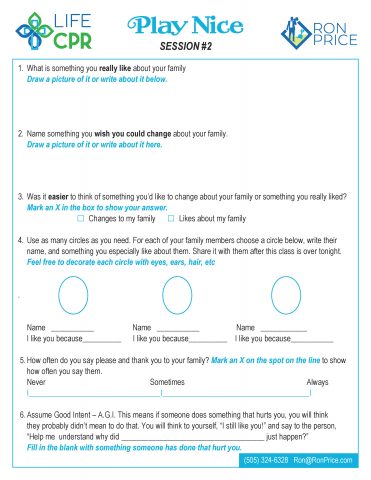
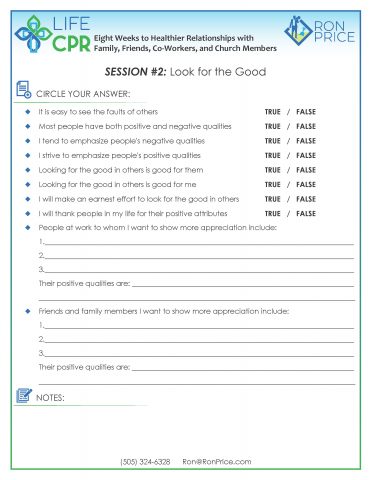
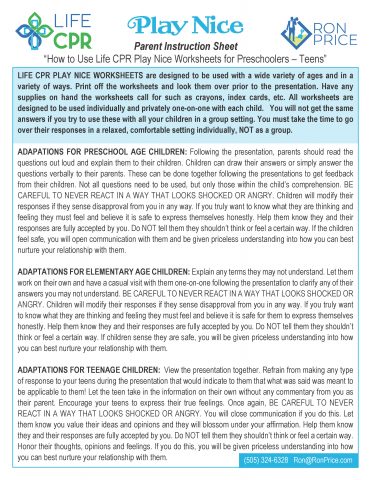
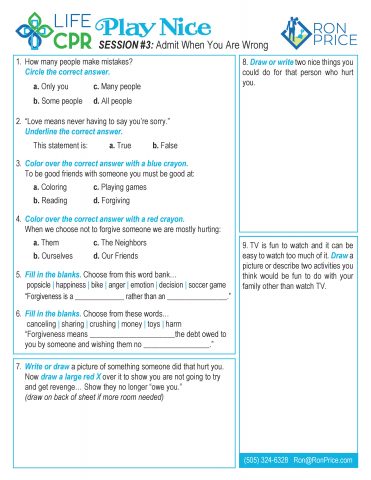
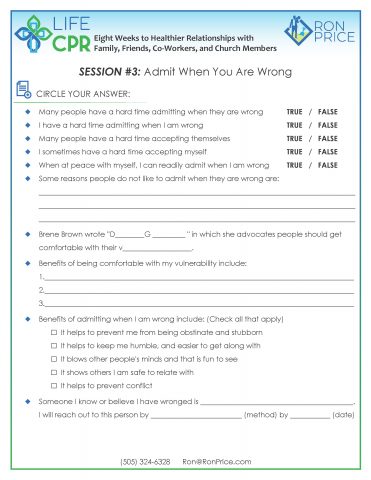
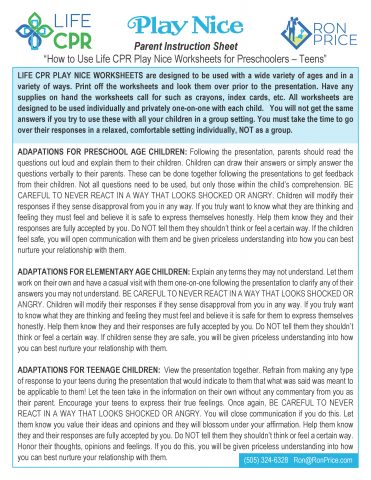
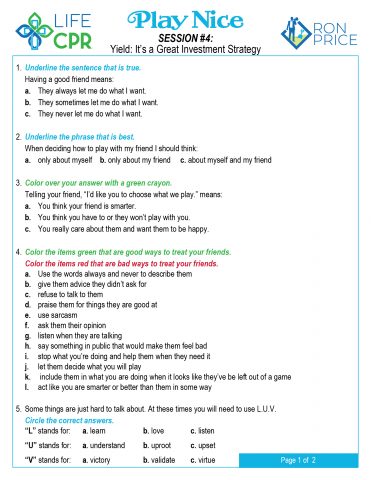
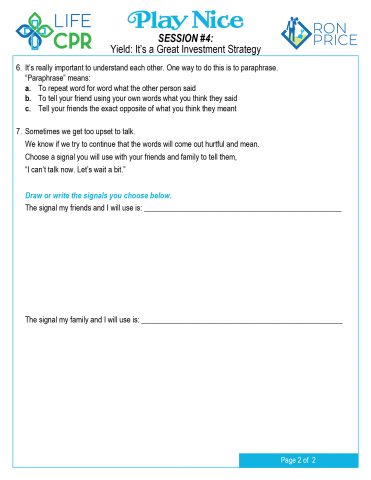
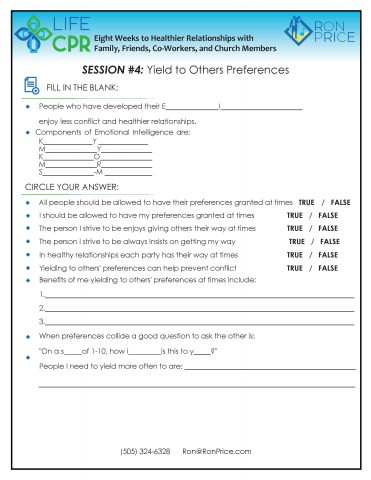
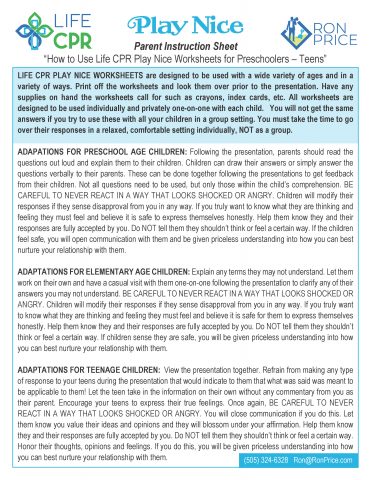
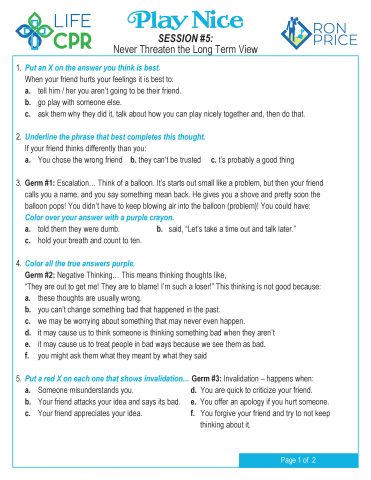
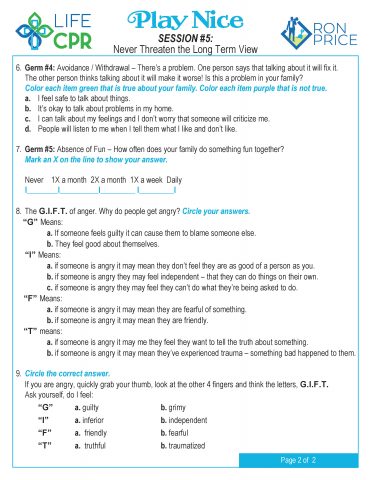
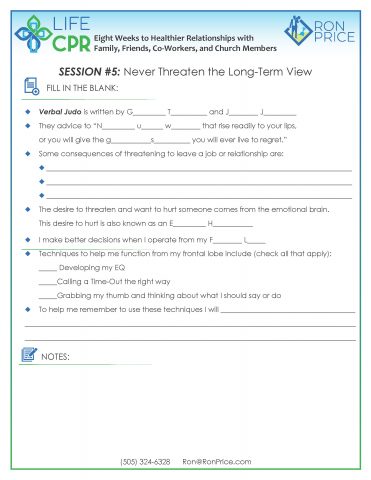
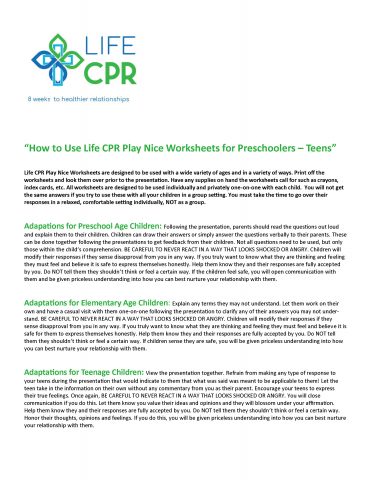
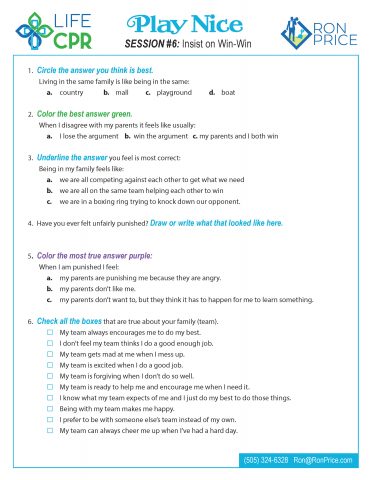
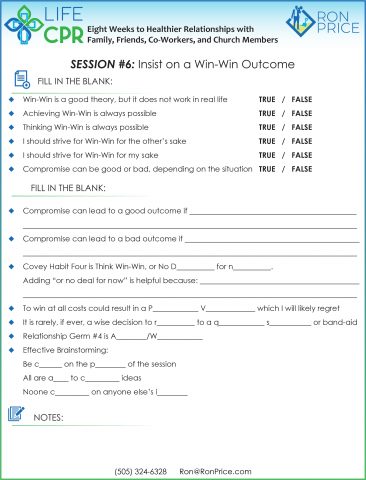
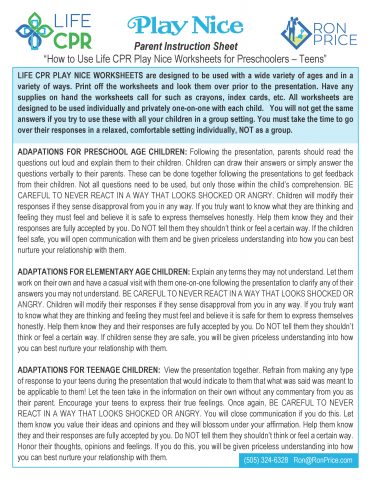
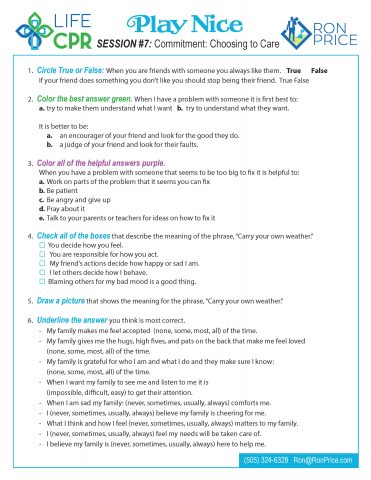
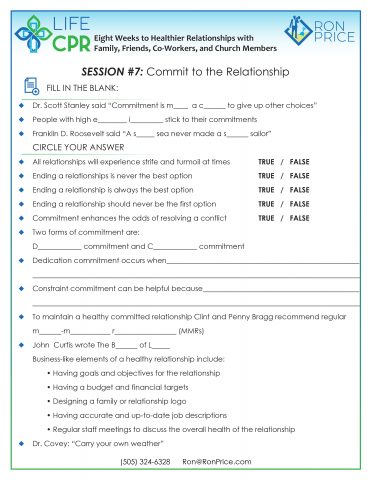
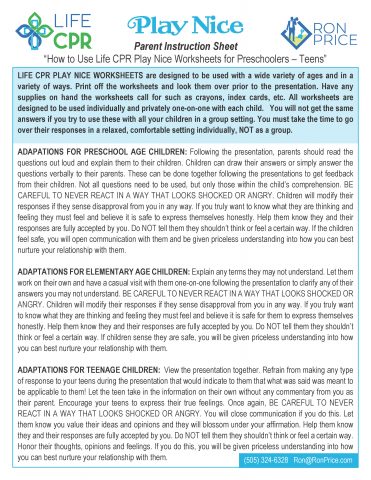
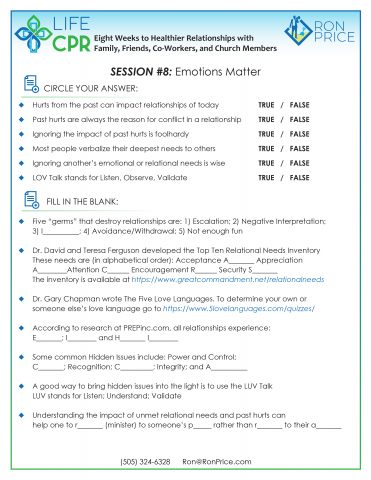
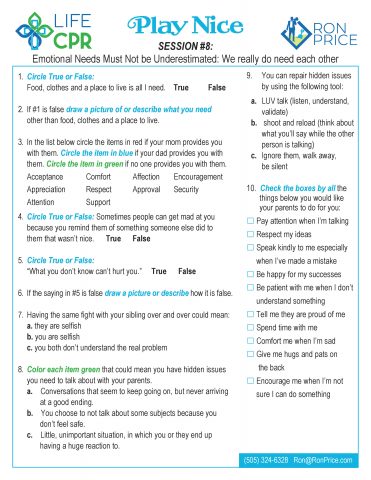
Feeling stressed... Here's something that may help!
If you are a living, breathing human being you have relationships…If you are young you have relationships with siblings, parents, friends, classmates and teachers. If you are older you have relationships with children, spouses, friends and coworkers. Life CPR will give you tools to make these relationships the best they can be! Join us for a lighthearted and informative hour to help you improve the important relationships in your life Tuesday evenings from 6:00-7:00 pm April 6 to May 25 for Life CPR: 8 weeks to healthier relationships. To register or for questions email cbarker@ks-ne.org or call 785-478-4726.
Here's the link to the 2nd YouTube video promoting Life CPR.
Thank you for sharing this in your churches, emailing it to your friends and posting it on your social networks.


"10 Days of Prayer for Kids"
Hey parents...did you know there is a "10 Days of Prayer" for kids? Yes, there are 10 short worships designed for you to use with your kids January 6-16, 2021. Here's the link!
https://www.ks-ne.org/.../childrens.../kids-worship-ideas

Tune in to Joy
In times of uncertainty, it can be easiest to tune in to what’s making you anxious.
After all, these days you may be regularly confronted with a waterfall of new information, eroding what “normal” used to look like. Anxiety comes in loud and clear.
It’s important, now more than ever, to not let anxiety drown out joy. Practice tuning in to joy with your partner by asking them, at the end of every day, “what brought you joy today?”
It may be as simple and small as something that made you laugh, or it can be something as immense as a shift in the weather that brightened the whole day.
Give joy a chance to shine.
End it Now Summit on Abuse is live now! Vital information regarding abuse. Click here to view summit.
https://www.facebook.com/watch/live/?v=366891391090631&ref=watch_permalink
Tips on Marriage from Mike Tucker of "Mad About Marriage"
Intimacy in marriage is the art of making your spouse feel wanted, valued, understood, supported, and deeply loved.
Intimacy is both a feeling and a decision that starts with choosing to be intimate, followed by acting/being intimate; intimate feelings follow intimate behavior.
The starting place is with emotional intimacy because it paves the way for all other forms of intimacy.
Intimacy is an art.
When life gets busy with work, kids, and commitments, intimacy can suffer.
Everyone else's needs come first while yours suffer, especially time with your spouse, your most important commitment of all.
How do you keep intimacy alive when life gets crazy busy, especially like it does after becoming parents?
Consider these tips to create/maintain all levels of intimacy.
Avoid this BIG Mistake
The big mistake most spouses make is forgetting that they were a couple before anything else happened like having kids or starting that insanely-busy career.
Remember that you're married and act like it. Everything else will come and go in your life except your relationship.
You were a couple before kids, and you'll be a couple after they leave home.
You were a couple before your career took off, and you'll be a couple when you change jobs or retire.
You must do whatever it takes to protect your marriage and put your relationship first.
One of the pathways to enjoying and maintaining intimacy in marriage is always making time for each other.
Create intimate moments
As you take on more responsibilities and commitments, time will be a limiting factor.
So when you don't have the time you want, wish for, or need, create intimate moments amidst the chaos.
Give quick hugs often where you just hold each other for a few seconds; make meaningful, intimate eye contact; squeeze each other's hand gently.
Be intentional about enjoying intimate moments.
Reassure One Another
Create emotional intimacy by taking time to build each other up - let your partner know they're on your mind.
It can be a text, call, voice audio, video...let them know how amazing you think they are and how happy they make you; remind them why you want to spend the rest of your life with them.
Flirt with each other
Stoke the fires of intimacy by sending flirtatious texts, writing love notes, or by complimenting each other in a flirtatious manner. Make them feel wanted.
Make time for conversation
What did you like talking about before starting your career or having kids?
Embrace the intimate-generating power of conversation.
Couples who stop talking, start feeling they have less and less in common.
If new parents, enjoy parenthood together
Parenting can create a sense of closeness and intimacy IF you're intentional about it.
Savor the milestones; cherish each special moment that parenting brings.
Yes, it’s possible to bond even over diaper changes, potty training and other less glamorous parts of parenting!!
Schedule time together
Scheduling time and saying "no" to everything else is the ONLY way to get much needed “couple time.”
Without spending time together, emotional intimacy will fade. Once emotional intimacy starts to fade, physical intimacy soon follows.
Couples always assume they’ll do what needs to get done and then spend whatever time is left over together.
That does. not. work.
Scheduling time for your spouse let's them know and feel that they are a priority in your life, and vice versa. The feeling of being wanted fuels intimacy in marriage. Always make time for your spouse even if it means saying "no" to someone else.
Which one of these tips would you consider trying this week to create more intimacy in your relationship?
Until next time, this is Mike Tucker and I want YOU to be mad about marriage!


Have you heard about the Agape Conference, a virtual conference for leaders and families that begins tonight at 7:00 pm?
August 14-15 the NAD along with a few other organizations are sponsoring a variety of helpful seminars addressing the needs of children, families, Sabbath School teachers and leadership during this time of pandemic.
There are a large variety of helpful seminars to choose from. These 100+ seminars presented by 80 instructors are FREE and offered in three languages: English, Spanish and Portuguese. These are FREE seminars, but to participate in the seminars and general sessions you must register.
Here’s the link to register to be part of the 100+ seminars and general sessions!
https://agapeconference.org/registration/
Here’s a link to the amazing list of seminars and presenters.

You may already be familiar with The Four Horsemen (criticism, defensiveness, contempt, and stonewalling) but now that our context has shifted on a global scale, it’s worth taking a closer look at each and how they might show up at home.
First up is Criticism. Culturally, we are taught to be critical—to scan our environment for flaws and errors, to assign blame, and to exercise “critical thinking.” But criticism, when directed at your partner, can strain love over time.
Some hallmarks of criticism are the phrases “you always” or “you never.” They are a generalized, sweeping attack at your partner’s character, rather than pinpointing a specific incident or behavior.
For example, “You always leave dirty dishes in the sink,” or, “You never tell me when you’re on a call. It's so inconsiderate.”
Statements like these prime your partner to be defensive. Their first response may be to come up with a time when they didn’t leave dirty dishes in the sink, told you they were on a call, or to defend their behavior (“I’m busy! I’ll get to them later” or “I didn’t think you cared!”).
Ultimately, this is counterproductive. In the next Marriage Minute, we’ll go over the antidote to Criticism: the Softened Start-Up. But for now, reflect on the story you tell yourself about criticism.
Where does criticism show up in your life and how might you be able to transform it? What is it accomplishing? Do you tell yourself it's useful? How might it be detrimental?
The Four Horsemen: The Antidotes

The first step in effectively managing conflict is to identify and counteract The Four Horsemen when they arrive in your conflict discussions. Luckily, for every horseman there is an antidote, and you can learn how and when to use them below.

ll relationships, even the most successful ones, have conflict. It is unavoidable. Fortunately, our research shows that it’s not the appearance of conflict, but rather how it’s managed that predicts the success or failure of a relationship. We say “manage” conflict rather than “resolve,” because relationship conflict is natural and has functional, positive aspects that provide opportunities for growth and understanding.
And there are problems that you just won’t solve due to natural personality differences between you and your partner, but if you can learn to manage those problems in a healthy way, then your relationship will succeed.
The first step in effectively managing conflict is to identify and counteract The Four Horsemen when they arrive in your conflict discussions. If you don’t, you risk serious problems in the future of your relationship. But, like Newton’s Third Law, for every horseman there is an antidote, and you can learn how and when to use them below.
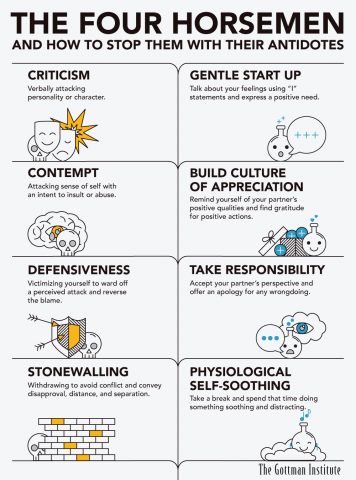
You can download a free PDF version of the The Four Horsemen and Their Antidotes here.
The Antidote to Criticism: Gentle Start-Up
A complaint focuses on a specific behavior, but criticism attacks a person’s very character. The antidote for criticism is to complain without blame by using a soft or gentle start-up. Avoid saying “you,” which can indicate blame, and instead talk about your feelings using “I” statements and express what you need in a positive way.
To put it simply, think of these two things to formulate your soft start-up: What do I feel? What do I need?
Criticism: “You always talk about yourself. Why are you always so selfish?”
Antidote: “I’m feeling left out of our talk tonight and I need to vent. Can we please talk about my day?”
Notice that the antidote starts with “I feel,” leads into “I need,” and then respectfully asks to fulfill that need. There’s no blame or criticism, which prevents the discussion from escalating into an argument.
The Antidote to Contempt: Build a Culture of Appreciation and Respect
Contempt shows up in statements that come from a position of moral superiority. Some examples of contempt include sarcasm, cynicism, name-calling, eye-rolling, sneering, mockery, and hostile humor. Contempt is destructive and defeating. It is the greatest predictor of divorce, and it must be avoided at all costs.
The antidote to contempt is to build a culture of appreciation and respect in your relationship, and there are a few ways to do that. One of our mottos is Small Things Often: if you regularly express appreciation, gratitude, affection, and respect for your partner, you’ll create a positive perspective in your relationship that acts as a buffer for negative feelings. The more positive you feel, the less likely that you’ll feel or express contempt!
Another way that we explain this is our discovery of the 5:1 “magic ratio” of positive to negative interactions that a relationship must have to succeed. If you have five or more positive interactions for every one negative interaction, then you’re making regular deposits into your emotional bank account, which keeps your relationship in the green.
Contempt: “You forgot to load the dishwasher again? Ugh. You are so incredibly lazy.” (Rolls eyes.)
Antidote: “I understand that you’ve been busy lately, but could you please remember to load the dishwasher when I work late? I’d appreciate it.”
The antidote here works so well because it expresses understanding right off the bat. This partner shows how they know that the lack of cleanliness isn’t out of laziness or malice, and so they do not make a contemptuous statement about their partner or take any position of moral superiority.
Instead, this antidote is a respectful request, and it ends with a statement of appreciation.
The Antidote to Defensiveness: Take Responsibility
Defensiveness is defined as self-protection in the form of righteous indignation or innocent victimhood in attempt to ward off a perceived attack. Many people become defensive when they are being criticized, but the problem is that being defensive never helps to solve the problem at hand.
Defensiveness is really a way of blaming your partner. You’re saying that the problem isn’t me, it’s you. As a result, the problem is not resolved and the conflict escalates further. The antidote is to accept responsibility, even if only for part of the conflict.
Defensiveness: “It’s not my fault that we’re going to be late. It’s your fault since you always get dressed at the last second.”
Antidote: “I don’t like being late, but you’re right. We don’t always have to leave so early. I can be a little more flexible.”
By taking responsibility for part of the conflict (trying to leave too early), even while asserting that they don’t like to be late, this partner prevents the conflict from escalating by admitting their role in the conflict. From here, this couple can work towards a compromise.
The Antidote to Stonewalling: Physiological Self-Soothing
Stonewalling is when someone completely withdraws from a conflict discussion and no longer responds to their partner. It usually happens when you’re feeling flooded or emotionally overwhelmed, so your reaction is to shut down, stop talking, and disengage. And when couples stonewall, they’re under a lot of emotional pressure, which increases heart rates, releases stress hormones into the bloodstream, and can even trigger a fight-or-flight response.
In one of our longitudinal research studies, we interrupted couples after fifteen minutes of an argument and told them we needed to adjust the equipment. We asked them not to talk about their issue, but just to read magazines for half an hour. When they started talking again, their heart rates were significantly lower and their interaction was more positive and productive.
What happened during that half hour? Each partner, without even knowing it, physiologically soothed themselves by reading and avoiding discussion. They calmed down, and once they felt calm, they were able to return to the discussion in a respectful and rational way.
Therefore, the antidote to stonewalling is to practice physiological self-soothing, and the first step of self-soothing is to stop the conflict discussion and call a timeout:
“Look, we’ve been through this over and over again. I’m tired of reminding you—”
“Honey, I’m sorry to interrupt you, but I’m feeling overwhelmed and I need to take a break. Can you give me twenty minutes and then we can talk?”
If you don’t take a break, you’ll find yourself either stonewalling and bottling up your emotions, or you’ll end up exploding at your partner, or both, and neither will get you anywhere good.
So, when you take a break, it should last at least twenty minutes because it will take that long before your body physiologically calms down. It’s crucial that during this time you avoid thoughts of righteous indignation (“I don’t have to take this anymore”) and innocent victimhood (“Why is he always picking on me?”). Spend your time doing something soothing and distracting, like listening to music, reading, or exercising. It doesn’t really matter what you do, as long as it helps you to calm down.
You’ve got the skills. Use them!
Now that you know what the Four Horsemen are and how to counteract them with their proven antidotes, you’ve got the essential tools to manage conflict in a healthy way. As soon as you see criticism or contempt galloping in, remember their antidotes. Be vigilant. The more you can keep the Four Horsemen at bay, the more likely you are to have a stable and happy relationship.

Self-soothing
Are you stressed out? Maybe your resting state just has a layer of anxiety on top of it now, making it easier for you to become flooded.
Flooding is another word for physiological overwhelm, which you may or may not even be aware of as it is happening. Flooding can lead to blowing up or shutting down. And shutting down—stonewalling—is one of the Four Horsemen.
Like the other three Horsemen, stonewalling has an antidote. The cure for stonewalling is self-soothing.
If you find yourself stonewalling, listen up! This antidote is on you to practice and employ. You can’t make your partner self-soothe, and vice versa.
What you can collaborate on with your partner is a signal that either of you can use to let them know you need to take a break to reset. It can be a code word, a hand signal, anything you agree on that means “I’m getting overwhelmed. I need at least 20 minutes.”
Then, take that break and breathe, walk it off, or listen to some music. Just avoid teetering into righteous indignation (ruminating on the conflict that overwhelmed you in the first place) or innocent victimhood (“I can’t believe they did this to me. This is all their fault.”)
After taking the time to wind down, you can engage with your partner again. You don’t even have to be ready to apologize (if that’s what’s in order). But once you’re no longer flooded, you’ll be in a better place to listen and empathize.
5 SIMPLE TIPS FOR TAMING TANTRUMS
I came across this quote from author L.R. Knost not long ago and it has become my mantra for calming meltdowns, tantrums and anything in between.
“When little people are overwhelmed by big emotions, it is our job to share our calm not join their chaos.”
Tantrums are a completely normal part of child development. It’s how our little ones express themselves over anything from discomfort to simply not getting what they want. But that doesn’t mean it’s not exhausting, frustrating and down right chaotic to try and diffuse them. Sometimes the response that our children need the most is the hardest to offer in the moment. In my experience, the most effective method for disarming a tantrum is a calming, positive approach. Here are 5 Simple Tips for Taming Tantrums that may help to deescalate meltdowns and preserve your sanity.
1.) Remain Calm
It is entirely true that children feed off of our emotions. If we treat a child’s tantrum with fierce anger and frustration it is possible to intensify the tantrum rather than mitigate it. Try to remove all emotion and focus on yourself, especially the guilt or embarrassment which can heighten feelings of overwhelm (remember, every parent has been there!) Your child isn’t trying to give you a tough time, they’re having a tough time.
2.) Use Positive Language Alternatives
Avoid the use of “no” if at all possible and try these positive language alternatives.
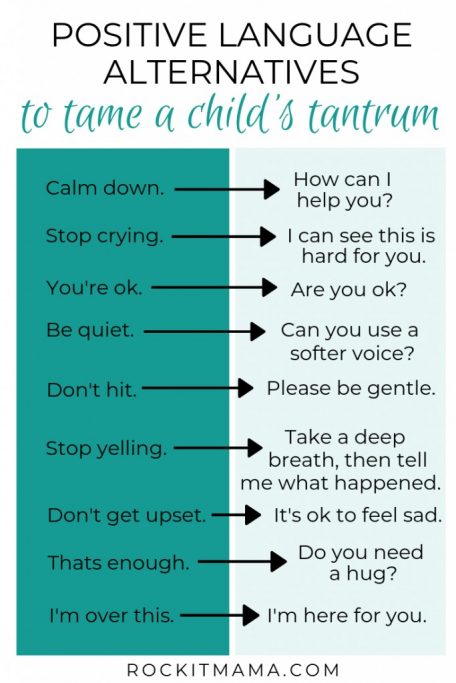
3.) Try a Calming Diversion
Does your child have a favorite book or comforting blanket? Offering these items could help console a child during a tantrum. Other tools could be a calming jar (such as these), relaxation activities such as deep breaths or yoga poses, essential oils, and songs. When the meltdown occurs in a public place without access to these tools, try removing them from the environment in which the situation began. If your child runs, throws or hits during a meltdown assess surroundings to ensure safety before approaching.
Hugging is an excellent use of diversion, but always ask if they need a hug beforehand. Studies have shown that proprioceptive input through hugging is extremely helpful for regulating the senses and helping tame a tantrum. Something as simple as a tight squeeze can provide a sense of calm & return your child to the moment.
4.) Observing and Learning
Is there a pattern or trend for where these tantrums occur? Say, in the toy section at Target or when deciding on what to wear in the morning? Research indicates that events leading up to a tantrum can be critical to whether or not it actually occurs. Noticing where and when your child is likely to have a tantrum is essential in diffusing or avoiding it altogether. Maybe bypass the toys next time at the store, or offer options on outfits in the morning so your child feels in control. Another thing to keep in mind is choosing battles wisely. Ask yourself this question:
Will this decision impact my child down the road?
Examples: Something like, wearing a helmet on the tricycle could potentially have long term effects and is probably a battle to be fought. Forcing a child to hug a relative before they leave (and thus inducing an incident) is likely not life altering. Maybe have a conversation later about hugging and why we show affection instead of ensnaring yourself in an emotionally escalated situation.
5.) Consistency and Not Caving
A sure-fire way to keep the tantrums coming is to cave or give in to the tantrum. For example, if a child melts down in the candy aisle begging for a lollipop, giving her the lollipop will underline the negative behavior and reinforce it for next time. If the child is denied the lollipop repeatedly, it’s possible for them to learn that a tantrum in this particular instance will not get them what they want. Be consistent and confident with your choices as you know best for the child, not vice versa.
Good Goals for the New Year
Laws of the Lighthouse
by Max Lucado
The first of the year is known for three things: black-eyed peas, bowl games, and lists. Some don’t eat black-eyed peas. Others hate football. But everybody likes lists.
The Bible certainly has its share of lists. Moses brought one down from the mountain.
There are lists of the gifts of the Spirit. Lists of good fruit and bad. Lists of salutations and greetings. Even the disciples’ boat got into the action as it listed in the stormy Sea of Galilee. (If you smiled at that, then I’ve got a list of puns you’d enjoy.)
But the greatest day of lists is still New Year’s Day. And the number one list is the list I call the Laws of the Lighthouse.
The Laws of the Lighthouse contain more than good ideas, personal preferences, and honest opinions. They are God-given, time-tested truths that define the way you should navigate your life. Observe them and enjoy secure passage. Ignore them and crash against the ragged rocks of reality.
Smart move. The wise captain shifts the direction of his craft according to the signal of the lighthouse. A wise person does the same.
Herewith, then, are the lights I look for and the signals I heed:
- Love God more than you fear hell.
– Once a week, let a child take you on a walk.
– Make major decisions in a cemetery.
– When no one is watching, live as if someone is.
– Succeed at home first.
– Don’t spend tomorrow’s money today.
– Pray twice as much as you fret.
– Listen twice as much as you speak.
– Only harbor a grudge when God does.
– Never outgrow your love of sunsets.
– Treat people like angels; you will meet some and help make some.
– ‘Tis wiser to err on the side of generosity than on the side of scrutiny.
– God has forgiven you; you’d be wise to do the same.
– When you can’t trace God’s hand, trust his heart.
– Toot your own horn and the notes will be flat.
– Don’t feel guilty for God’s goodness.
– The book of life is lived in chapters, so know your page number.
– Never let the important be the victim of the trivial.
– Live your liturgy.
To sum it all up:
Approach life like a voyage on a schooner. Enjoy the view. Explore the vessel. Make friends with the captain. Fish a little. And then get off when you get home.
From In the Eye of the Storm
© (Thomas Nelson Publishers, 2006) Max Lucado
5 Rituals to Reconnect in Your Relationships
In his book The Intentional Family, Bill Dougherty discusses “rituals of connection” as an important tool for successful relationships. A ritual of connection is a way of regularly turning towards your partner that can be counted on.
Erica and Rob, both in their late forties, have been happily married for ten years and are raising three children. When I asked Rob about the rituals in their marriage, he reflects:
We hug every day when I get home because physical touch is one of my Love Languages. Erica is not as affectionate as I am, but she’s up for it because she know’s how important it is to me.
Couples with relationships rich in rituals and traditions are able to create shared meaning, the top level of the Sound Relationship House.
Daily rituals shape our lives in positive ways
In The Power of Habit, author Charles Duhigg explains that habits are crucial to success in all realms of our life. Overall, they make us more productive and healthier. In a relationship, Dr. Gottman calls these habits rituals of connection.
Here are five rituals to help your relationship thrive.

1. Eat meals together without screens
It may not be possible to do this for every meal, but whenever possible, turn off the TV and put away your cell phone. Your emails and Facebook feed can wait.
2. Have a stress-reducing conversation
Spend 30 minutes each day having a “how was your day, dear?” talk. Kyle Benson explains that the purpose of this conversation is to discuss external stress. It’s not a time to bring up issues about your relationship. Couples who actively listen, take turns sharing how they feel, and show compassion to each other will reap the rewards of more emotional connection in their marriage.

3. Take a vacation
Take an annual vacation without the kids to somewhere you both agree upon. Drs. John and Julie Gottman have an annual honeymoon in the San Juan Islands off the coast of British Columbia. If your budget doesn’t allow you to take a vacation, you might try camping or looking for moderately priced accommodations nearby for a long weekend.

4. Exercise together
Go biking together every Saturday morning or take a daily post-dinner walk with your partner. Add a little novelty and excitement by trying kayaking in the summer or cross country skiing in the winter months. Studies show that sharing an exciting experience can bring couples closer together.

5. Share a six-second kiss
A daily six-second kiss will increase your emotional and physical intimacy. According to author Dr. Kory Floyd, physical contact releases oxytocin (the bonding hormone), can improve our mood (for days), and can help you stay calm. Holding hands, hugging, touching, and making out can reduce your stress hormones (cortisol) and increase your sense of relationship satisfaction. If kissing for six seconds feels like too much, share a hug like Erica and Rob.
Never underestimate the power of intentional time with your partner. Doing fun things together like singing in the shower or riding a bike can bring joy and laughter. Telling jokes, watching funny movies, or anything else that brings you both pleasure can ignite passion and keep you connected.
Dr. John Gottman suggests that couples commit to a magic six hours a week together, which includes rituals for saying goodbye in the morning and reuniting at the end of the day. Sticking to these rituals will help you to reconnect when life gets in the way.
The Marriage Minute is a new email newsletter from The Gottman Institute that will improve your marriage in 60 seconds or less. Over 40 years of research with thousands of couples has proven a simple fact: small things often can create big changes over time.

NAD EnditNow Summit on Abuse - Facebook Live

The Little Things That Will Make or Break Your Relationship

9 Tactics a Child Preditors Uses to Silence an Observant Parent #ChurchToo

"Separation Anxiety"
Many of you have children and are dealing with this right now with your child. Here's a video with some tips on how to ease the separation anxiety your child may experience as he/she begins school...

6 Simple Routines For Back-To-School Sanity
We are creatures of habit – whether we like it or not. As the long, lazy, unstructured days of summer come to a close, many of us feel an unbidden craving for the cozy, comfortable, structured routines of fall. Indeed, this craving presents because our brains are actually wired for the safety of routine.
Read More
